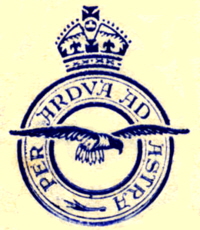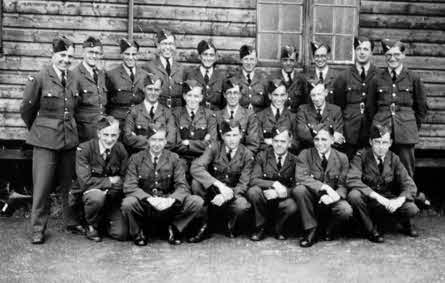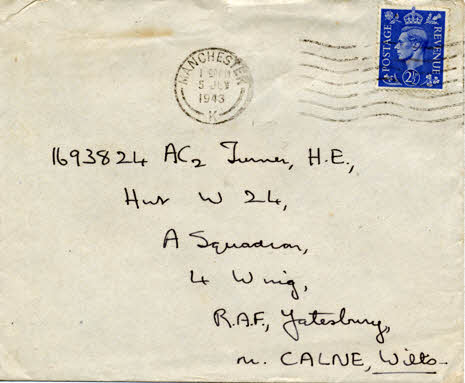
| FOOTNOTES TO FANDOM #4 | FOOTNOTES Page | Obituary Page | |
| |||
|
After completing a lengthy radio course at Birmingham College of Technology, enjoying the comfort of civvy billets, I was among those posted, at the end of February 1943, to Yatesbury Radio School, in deepest Wiltshire, to continue working on more hush-hush developments...
Months before, while training at Redcar, I'd had a postcard from Arthur Clarke, then stationed at Yatesbury. I wondered if he was still here. I had a fleeting glimpse of a corporal who was his double, in charge of a squad that marched past me while I was being pushed around in those first few days, but adjusting to camp routines, familiarising myself with the geography of the place, and then being put on a night shift, meant that several days passed before I was able to track him down.
Last night I went down to the music circle with Arthur... as well as the gramophone concerts, there's a station orchestra (with several ex-members of the BBC Symphony) which plays occasionally. When we got back to the huts Arthur left me with his telescope while he went for a shower. I had to balance the tube against the doorpost and crane my neck to get a peek at Jupiter before searching for the comet, which I picked up eventually... Evidently Arthur is a familiar figure hereabouts, since several passersby in the darkness made cracks like 'old Rocket Clarke up to his tricks again'. Which reminds me to ask if you'll bring along any new copies of the Scientific American when we get together. Arthur would like to see 'em as he's not been able to get hold of any copies for ages. Marion's reply included mention of a steady stream of Astonishing Stories that had been arriving at home from an anonymous source; she didn't rate the contents very highly. We suspected that they were a tongue-in-cheek contribution from Doug Webster. When I mentioned this to Arthur it turned out he'd been starved of current sf also. I hastily wrote to Marion to say that I'd found a way of disposing of the pulp-mags, and to send them on before Arthur changed his mind.
Not only were we fire-lighting on Monday but had to go on parade early for a session slinging rifles about, and then a PT period heaving heavy logs around. By the time I got to the Radio School for instruction I was worn out. Most of the class were yawning and dozing off during the lectures. After all that, on my return to the main camp, I was put on guard duty that night. So I was glad to get to the music circle for a change and a rest last evening. Arthur was in charge again, so I gave him a lift with the records though unfortunately one of the pick-ups had been damaged and we had to manage with a single turntable, so it was a bit more stop and go than usual without the fading-in of sides. After all my recent exertions I tended to doze off now and again. However, Arthur has a habit of turning up the volume until the sound waves almost knock you over... which kept me alert enough to cope with record changes. Needless to say all requests from the front rows to turn down the volume were ignored... It was a welcome break to be excused fatigues after a series of inoculations for something-or-other, but I promptly lost interest in life with a throbbing arm and the sight of fellow-sufferers agonising around me. The music circle was cancelled as concert pianist Marjorie Few, who had been playing with the London Philharmonic at nearby Marlborough, was persuaded to give a recital at the station theatre before returning to London. I decided not to go, still feeling groggy from the inoculations, but Arthur came in, panting, all enthusiasm, to collect me. So I went, enjoyed Beethoven, Rachmaninov, Chopin, and Liszt and felt all the better for it...
Spent most of this evening waiting for a haircut, and reading The Glass Giant of Palomar in a hurry before Arthur departs. When I called on him, I found him lying on his bed with sf mags on one side, the book on Lowell propped up in front of him, and the Scientific Americans buried under some laundry at the other side. He picked up an Astonishing, flicked through the pages briefly and then heaved it into his locker, seized the Lowell book and started to career through it at the rate of sixty pages a minute. Then with an impatient snort he dug out one of the Scientific Americans from under the pile of clothes and started to skim through Russell's article. Inadvertently he knocked over a pile of letters, cursed, leaned over to stop the avalanche, caught sight of me at the door, beamed heartily and explained that he'd just finished Russell's article and thought it particularly good! He tickles me; he's so impetuous, always in a devil of a rush to do innumerable things. Strangely enough, he does seem to get a lot done—or at least leaves that impression. I called on him one evening a short time later, to be treated to the spectacle of him packing. He had three large suitcases and his kitbag spread over the floor, kept whipping things out of one and into another, only to change his mind and reverse the process a few seconds later. The whole process was slowed down by the discovery of forgotten things at the bottom of the cases. We carried on a conversation separated by a mounting pile of Arthur's possessions. Eventually he disappeared behind it altogether, though I could hear him cussing mildly in between exchanges of opinion. I left him to it and crept back to my hut. When I met up with him in the canteen at supper, he was immersed in a book of war verse; apparently packing had been suspended after he unearthed this treasure.
I managed to skip through the rest of The Glass Giant of Palomar in time to pass it back—sad that the war has held up further progress after most of the difficulties had been surmounted. The money spent on experiments with fused quartz for the mirror was enough to have bought the 60" Yerkes telescope and equipment, yet the experiments weren't successful. Hale's efforts at getting money to back the 60", 100" and 200" telescopes certainly would sound well-nigh incredible in a novel. The BIS could do with engaging the services of someone with Hale's persuasiveness... Arthur has departed. He came dashing in just as I was breakfasting in bed this morning—he's going to Cosford, near Wolverhampton, for the next six weeks, but has no idea where he'll go from there. He did have hopes of returning here when he'd got his commission but apparently the prospect is remote... As a parting gift, Arthur returned all the copies of Astonishing. Fortunately an orderly corporal spotted them on a duty visit, eagerly asked to be put on the 'waiting list', and eventually carted them all away. At least they found a good home! Leisure activities seemed to fall apart after Arthur's departure. The music circle went into decline when all musical forces were mobilised by the commanding officer for a production of a Gilbert & Sullivan opera; the guiding genius behind the wall newspaper was posted and couldn't find a replacement editor; a new welfare officer resolutely cracked down on the more extreme political elements of the discussion group... But I had my head down, coping with the last few weeks of my technical course.
recalled by an occupant of Hut W 32, H Wing, A Squadron, RAF Yatesbury FOOTNOTES TO FANDOM #4... |
 |


